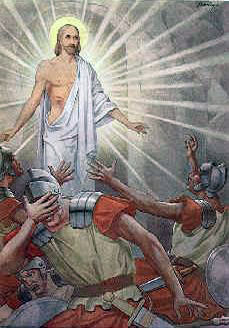podcast 55 – John Locke’s Second Vindication of his Reasonableness of Christianity
Locke fired back twice against Edwards’s criticisms of Locke’s The Reasonableness of Christianity.
Locke fired back twice against Edwards’s criticisms of Locke’s The Reasonableness of Christianity.
In the New Testament, is the Father God himself, or does the Father rather represent the one God?
Does John start his gospel at the same “beginning” as Mark 1:1?
What if you believe in Christianity, and it’s false? Have you lost much, really?
If God exists necessarily, and this not because of anything else (e.g. there’s some other necessary being which necessarily causes God to exist too), then what explains this? Our friend the Maverick Philosopher urges that the only explanation is that God’s essence just is God’s existence. I disagree. I now try again to start with God’s existence, and a few essential divine attributes which should… Read More »Dialogue with the Maverick Philosopher: God is a being, not Being itself – part 8
What is “classical” theism, and why is it controversial?

Of all the ancient catholic “fathers” I’ve read, Origen (c.185-254) is the most impressive as a scholar.
It’s not that I usually agree with him – any non-Platonist is going to choke on many of the dishes he’s serving, and I think that most today would take issue with some his ways of interpreting the Bible. But he has vast knowledge, he makes pretty careful distinctions, he knows how to argue, and is just a much more developed and original thinker than most. Any contemporary who was going to square off with him either did or should have considered him a formidable opponent.
He wrote, or rather dictated, a vast amount – evidently, he did little else. Some think he may have been the most prolific person in antiquity. We still have a fair number of texts from him.
He’s historically important for many reasons, but for this post, what’s most important is that in the 3rd century he was considered a stalwart of mainstream (“catholic”, or “proto-orthodox”) Christianity.
Lately I’ve been reading Origen’s Commentary on John, as translated by Ronald E. Heine, who by way, I have found very helpful. He too is a first-rate scholar.
Evidently, passage here is directed against certain monarchians who thought (or at least, were alleged to think) that the Father = the Son, i.e. that the Son is the Father himself and vice versa. This passage struck a nerve with me, as it reminded me of conversations I’ve had.
The references in brackets are from Heine’s footnotes.Read More »Origen: the Son is not the Father
The concept of logical form is essential to any discussion of identity, and hence to any discussion of the Trinity.
Continuing the conversation, apologist Tom Gilson stands by his claim that the NT doesn’t teach that Jesus had faith during his earthly life, and indeed, tellingly declines to say that. He says, in part, So the NT clearly comments on, and specifically names, many of Jesus’ virtues. If Dr. Tuggy is right, and the reason Jesus’ faith is not named as such is just because… Read More »Did Jesus have faith in God? – Part 5
 I woke up this morning, and realized that there is a problem with how I’ve been defining the concept of a unitarian. In this post, I will attempt a definition of the concept of a trinitarian, after reviewing what is required of a good definition. Next time, I’ll try to define the concept of a unitarian.
I woke up this morning, and realized that there is a problem with how I’ve been defining the concept of a unitarian. In this post, I will attempt a definition of the concept of a trinitarian, after reviewing what is required of a good definition. Next time, I’ll try to define the concept of a unitarian.
According to the textbook I have used for years in my critical thinking class, a good definition should:
What is a trinitarian?
Definition 1: someone who believes in a triune god.
Does my thought experiment offered as an objection to some Incarnation theories only show that a demon too could become a man?
What Origen actually says vs. what trinitarians wish that he’d said.
Is this a powerful, state-of-the-art biblical argument for the Trinity?
Two installments ago, we looked at Brian Leftow’s setup of the issue, and last time we surveyed his distinctive “Latin” trinitarian theory. This time, we’ll wrap it up. A rather obvious and potentially serious objection to Leftow’s theory is that it makes the doctrine of the Trinity out to be modalism, for plainly, in his view, each of the Persons is a mode of God… Read More »Leftow 4: “A Latin Trinity” – Part 3
Respected Catholic philosopher Alfred J. Freddoso corrects some pervasive baloney about persons which theologians are still repeating, these 22 years later! The asterisk marks his footnote – this whole passage is an aside in a very rich paper of his. Out of politeness, I omit the author of the wrongheaded passage, and I’ve added some bold highlighting to the whole thing. We’ve been over some… Read More »a quote every theology student working on the Trinity or Incarnation should memorize

Richard of St. Victor is well known for talking about love, and how awesome it is. It might surprise a few people who have only read the popular English translation of Book 3 (the love/ethics? book) that On the Trinity contains six books. The English translation has brought attention to what some contemporary (continental-esque) philosophers would call Richard’s ‘erotics’. What remains to be seen is whatever he says in Books 1, 2, 4, 5, and 6. In this post I’d like to focus on one theme in these other books, which I’ll call Richard’s Constitutional Latin Trinitarianism (= CLT). At the start I must say that I am claiming that Richard suggests a constitutional model of the Trinity and not that he straightforwardly proposes one. At least, Richard can be read to propose such a model–after all, certain later scholastics like Henry of Ghent seem to have read Richard in that way.
Read More »Richard of St. Victor 8 – A Proposed Constitutional Trinitarian Taxonomy (Scott)
Is it true that Peter was the first Pope?
At the Stand to Reason blog (this is the apologetics ministry founded by the inimitable Greg Koukl) I’ve been interacting with a few people on the question: Where Did Jesus Claim to Be God? In the current evangelical style, the poster Melinda Penner seems to understand this as equivalent to claiming to be God himself, to saying “I am God.” Never mind whether or not… Read More »Where did Jesus claim to be God?
For Justin, is Jesus “distinct in number, but not in substance” from the Father?